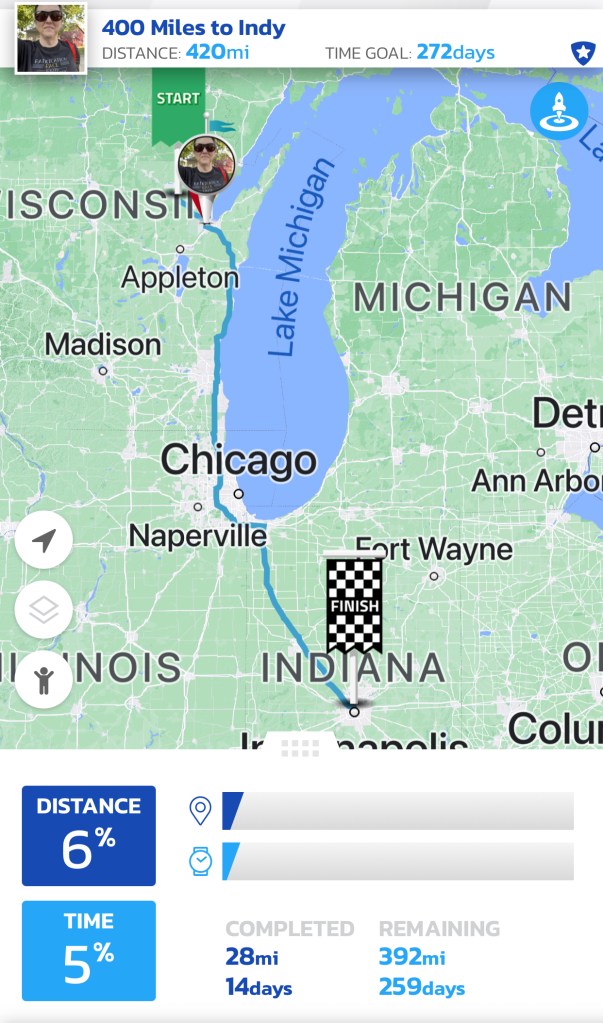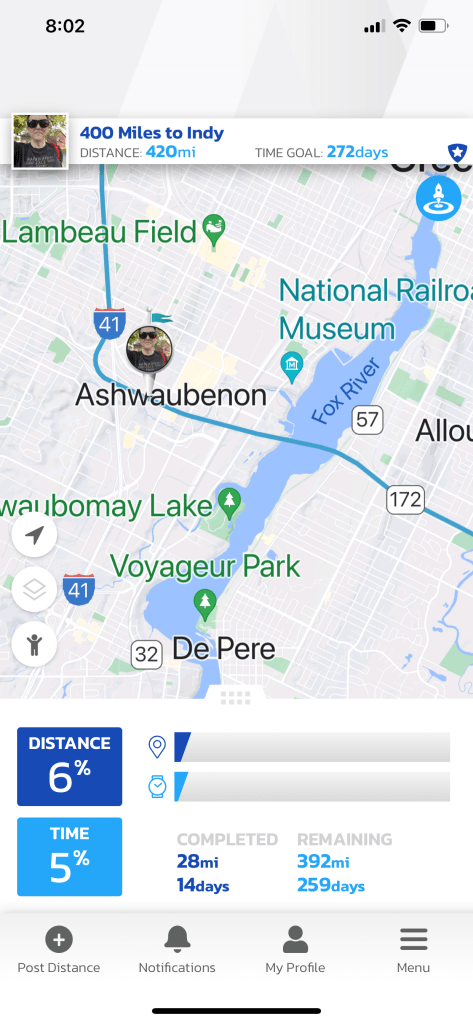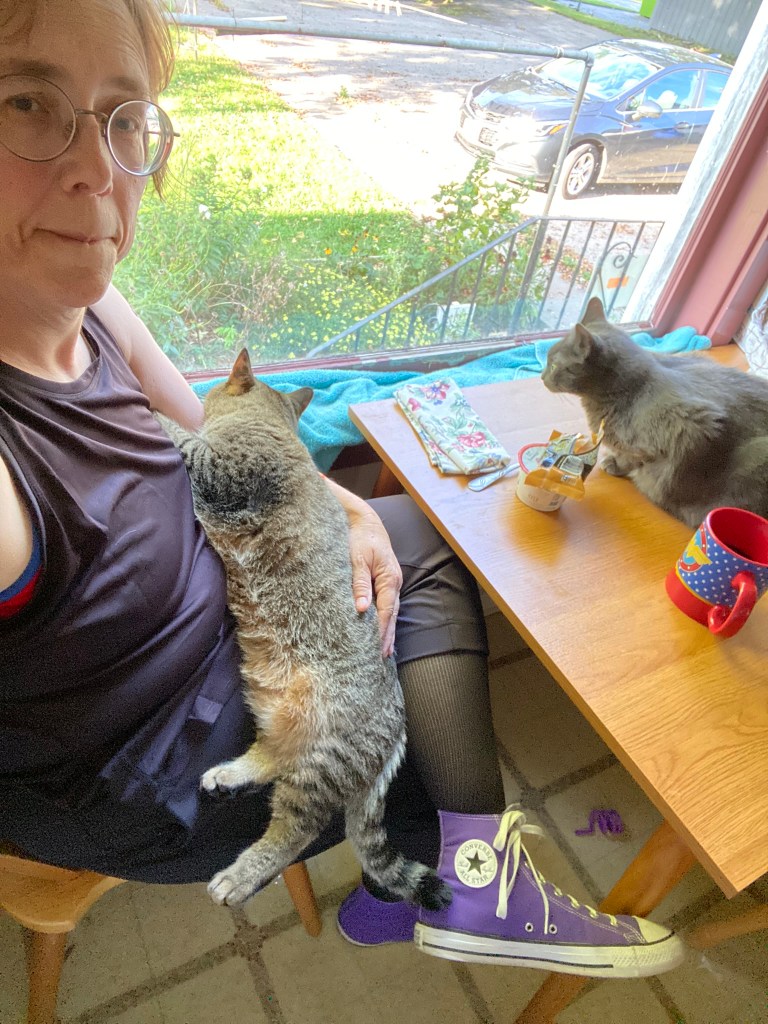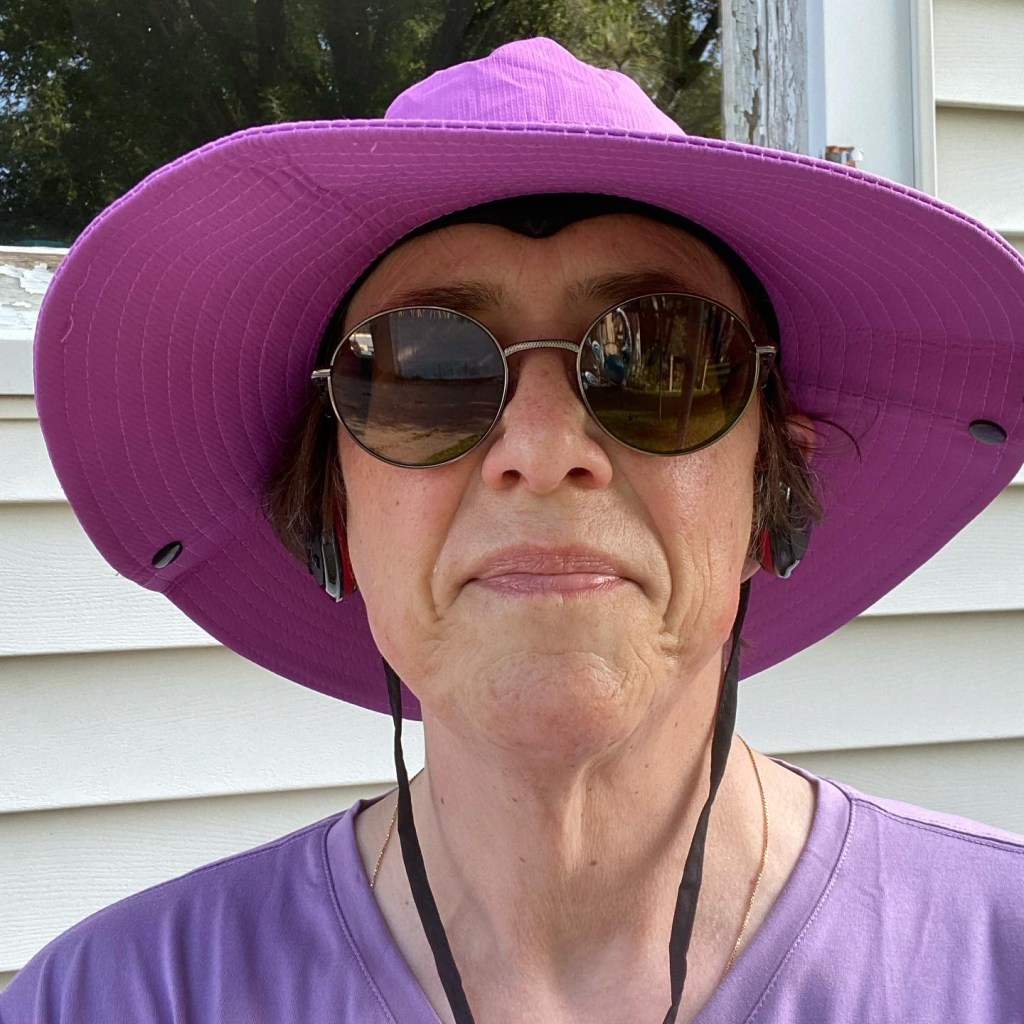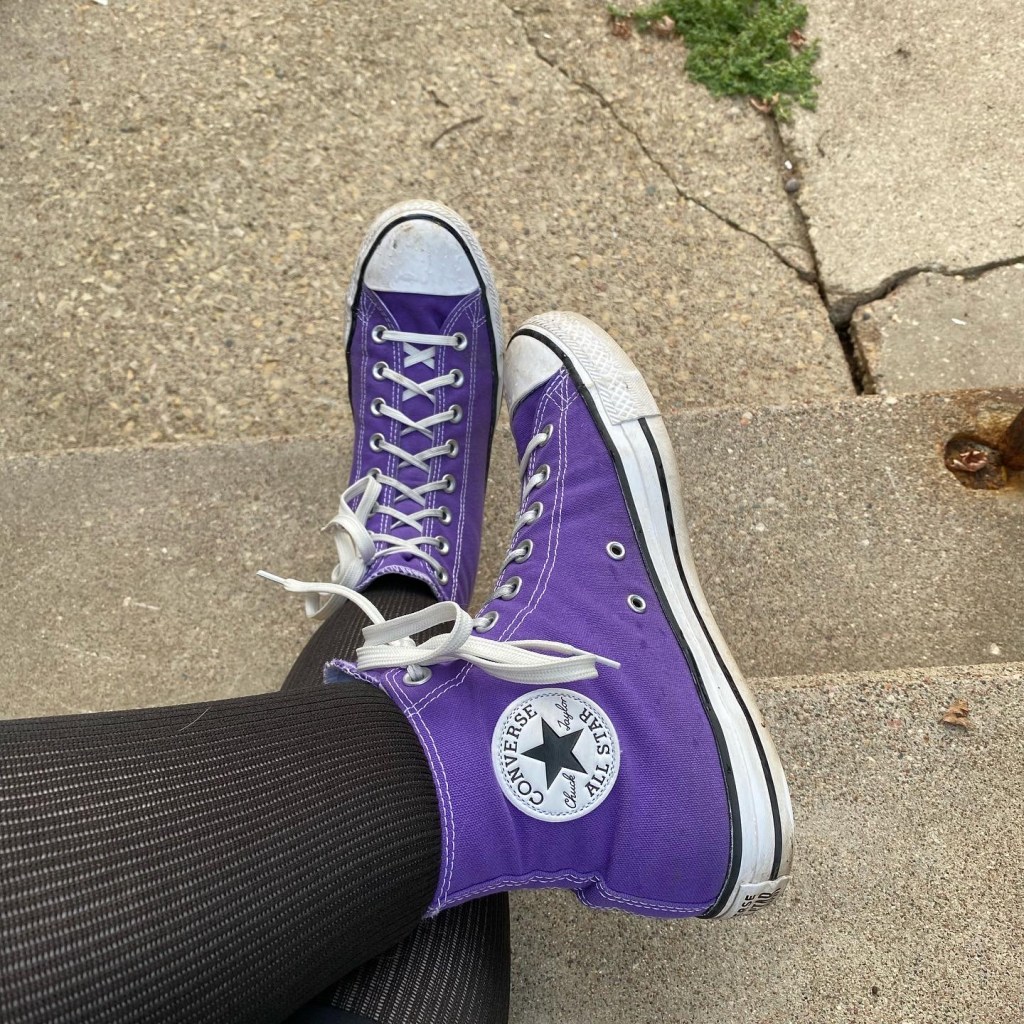It’s mid-April as I write this, spring is really coming to northern Wisconsin, and my self-imposed deadline of February 1st for creating new yearly materials for Break The Silence Sunday (BTSS) long past. There won’t be new materials for BTSS this year (for a lot of reasons which I hope to explain a bit here) but even as I write this, I can feel the guilt welling up inside of me.
It feels as if I’m letting survivors down, all of them, myself included. My brain knows that guilt is misplaced, a whole bunch of other emotions changing themselves into guilt because that’s an emotion survivors know very well. My brain knows that, but my heart isn’t sure. Perhaps as I write, as I try to explain to you gentle reader, my brain and heart might get on the same page and help me understand too.
The past twelve months have been full ~ for my parish, my family, and the world. There have been births, and deaths, and transitions to different kinds of living facilities; jobs lost and found; the challenge of living in a swing state during a US presidential election cycle; inflation (which we might well call corporate greed) stretching already stretched budgets, and resources, and spirits.
And there’s been war in Ukraine, and Palestine, and Sudan, and Syria, and Haiti, and Myanmar, and so many other places where the violence masquerades under other names, but the result is always the same ~ the innocent suffer, sexual violence increases, lives and dreams are destroyed.
All of this feels like I’m writing an excuse for not producing new BTSS materials, and I’m really not. I’m trying to find an explanation that will satisfy my own heart and mind about why in 2023-2024 I couldn’t bring myself to sit down and revisit the statistics ~ every 68 seconds in the US someone is sexually assaulted ~ to write prayers that only a few will read or actually pray, to beg at the doors of the wider church for recognition and support for survivors.
The short of it is, I’m tired.
I’ve been a rape survivor for nearly thirty-six years, working on understanding my trauma; navigating a world that doesn’t understand what living with a traumatized brain, body, and heart is like (it’s not just soldiers who live with PTSD); and trying to transform the trauma that I might not transmit the pain to others, and might use it to help transform the world. Some days all that work goes well, and some days not so well, even after all these years. All days it is a lot of work.
I’ve been an ordained pastor in the United Church of Christ for just over twenty-two years now, sharing the work of ministry, of building the kingdom of God’s abundance and justice right here and right now, with the most amazing people at St. John’s UCC Cecil, WI, Trinity UCC Shiocton, WI and St. John’s UCC Black Creek, WI. My life with them, all of us working together on the life of discipleship, is my greatest joy and my deepest honor.
And for those years of ordained ministry, I’ve also been working to find a way for survivors of sexual violence to be actively supported by our denomination (and all faith communities, but I work most where I am already, in the UCC), a denomination that espouses abundant and radical welcome, our slogan of the moment saying, “no matter who you are, no matter where you are on life’s journey, you are welcome here.”
That work has often felt like knocking on a closed, locked, barred, bolted, and sandbagged door. Bringing the voice and experience of survivors to the layers of the wider church has been met with resistance, and anger, and rejection. Yes, there have been moments of door opening, of heart opening, and I’ll talk about those in a minute, but the vast majority of my experience doing this work over the past twenty-two years has been exhausting in its frustration when told, time and time again, that we’ll get around to listening to survivors and honoring their experiences when something else isn’t more important.
There have been, as I said, incredible moments when the door started to move, sometimes even more than a fraction, and those moments help me hold on to hope.
In 2015, Break The Silence Sunday was born when my Wisconsin Conference Minister, the Rev Franz Rigert and I sat down and dreamed it up. He offered the support of the Wisconsin Conference in promoting whatever resources I could dream up for this work, and I am indescribably grateful for his support then and through all these years.
At the 2019 UCC General Synod in Milwaukee, WI we brought BTSS to the entire denomination as a resolution, to adopt BTSS for the whole church, to bring the work of supporting survivors in the church to every part of our tradition. That experience, being the proponent of the resolution, working with the committee (chaired by the amazing Rev Cheryl Lindsay) was extraordinary. Hearts, minds, and spirits were opened. Stories, tears, and laughter were shared. And overwhelmingly (691 in favor, and 10 opposed), BTSS became an observance of the entire denomination.
Then, after what I refer to as “the plague years” when covid changed everything about everything, BTSS had a booth at the 2023 General Synod in Indianapolis, IN. With our purple themed space in the exhibit hall, we welcomed and talked to folks, so many folks, about BTSS. Many hadn’t heard about it because the publicity the national church might have done about BTSS got lost in the covid crisis, and the social upheaval of that time. We were honored to listen to more than 130 stories of survivors during the five days of Synod, about 7% of the total attendance, and I am sure that there were many more stories that survivors weren’t yet able to share. It was heart-breaking, and heart-filling, and exhausting.
And as I write this, I realize I’ve written “we”. There is a we to this work. My dearest friends, Lella Baker and Helen Rowinski, make up the other parts of our team. Helen does graphics design and support for me, feeding the cats, feeding me, listening to me ramble, and more. Lella is logistics and as she calls herself the “emotional support pit bull”, giving up her vacation time to fly to Wisconsin to drive with me to Indianapolis to hand out pounds of purple wrapped candy and hear stories, and all the while making sure I have enough iced tea to keep going.
But that’s it. That’s the entire team. Mostly (and I think Helen and Lella are ok if I say this), mostly it’s me.
I’m the one dreaming up fund raisers ~ making and selling soup, walking 400 miles in my purple converse high-tops to get donations to get us gas money and exhibit space money, and all that purple candy for Synod (more than $6,000). With incredible contributions in prayers, and poems, and songs (for which I am eternally grateful), I am the one writing and organizing the liturgies, putting them together publishing them on the website (which we fundraise to pay for), giving the interviews to promote BTSS, and such. I’m the one who wrote the resolution, and answers survivor emails and calls, and honors so many stories (an average of four a week, every week). It’s me, and I’m tired.
So as Synod 2023 wrapped up and I had some time on my sabbatical in June and then again in January 2024, I found that I just couldn’t get myself to sit down and write anything new for BTSS. I decided it was time for a break and so instead of new materials for this year, we’ve been working on redesigning our website, making sure all the materials have proper attribution for copyright, and other such things that aren’t exciting, but are essential for the ongoing work.
And I was feeling pretty ok with that pause, the needed break to breathe and regroup about what happens next with all the challenges in the church and the world, until a few things happened.
The first was the realization that the number of survivor stores I heard every week was going up, a lot. When I first started speaking up about sexual violence and being a survivor in the church, the stories would drip in, one or two here or there. Then the incredible #metoo movement started by Tarana Burke came to public awareness and the number of stories I heard increased. And it’s kept increasing through the challenges of our life together during these last years.
In some sense, that’s a good thing. Survivors are feeling slightly more able to tell their stories, to be honest about their experiences, to find a listening heart and spirit that won’t replicate the victim blaming and shaming that they’re so often met with, in society and in church. But, it’s also a worrying trend. The number of young people, and particularly young men, who share their stories with me is sometimes overwhelming, as are the people who are in their older years, the ones who start their stories with “I didn’t know what to call it” or “I’m 70 and I’ve never said anything about what happened when I was 5.”
Then a pastoral colleague told me if I didn’t produce new liturgy every year BTSS would fail. They said that it would disappear from people’s minds and hearts if I wasn’t producing new materials, constantly putting it in front of people on every kind of social media, weekly emails and more.
When I asked them what they would do to help, if they might write a prayer, or mention BTSS on their personal or church social media, or have an observance of it in their church, or send a couple of dollars our way they said, “oh, I can’t do that because it would upset people. We can’t talk about shameful things like that at church, but you definitely have to keep doing it or nothing will change.”
And finally, in January, just about the time I would have started compiling materials for BTSS this year, I received the newsletter of a nearby UCC church which included a description of their upcoming Lenten series. Their theme “saying no” sounded interesting, and important.
We can’t faithfully say yes to everything because it leaves us stretched far too thin. But …and you knew, faithful reader, that there was a BUT coming didn’t you…
But, the title of their first week was “saying no means saying yes”.
There, in print, was the antithesis of everything I’d spend the previous thirty something years as a survivor, the previous twenty plus years as an ordained pastor, and the previous nine plus years as architect of BTSS working against. There it was, in this church’s newsletter, the continuation of the victim blaming and shaming that silence survivors, particularly in the church.
After I freaked out a bit, I checked with some other folks (Helen, Lella, and a trusted team) to make sure I wasn’t misreading, or over-reacting. They all agreed I wasn’t, that this is the very basics of consent education, the beginning of decency as a human being … no means no, and only yes means yes.
So, I reached out to the pastor, asking for some clarification, hoping that it had been an oversight, that they maybe just hadn’t read the title of that day’s talk out loud and hadn’t thought through the implications of saying in the name of the church, to a world where a low estimate is that 1 in 4 women and 1 in 10 men are survivors, that no means yes.
The response was underwhelming. The nearby UCC pastor, and the other pastor who was leading the series with them, had discussed it and considered the matter closed.
That’s it. No apology. No even attempt at explanation, communication, or conversation.
My heart gave way. I couldn’t imagine sitting down and writing even a single prayer, much less an entire liturgy, that would go up on our website, and be circulated amongst my UCC colleagues and wonder how many of them would respond the same way these two colleagues had ~ that they couldn’t do anything like BTSS in their church because it was private and shameful, or that they would look at the BTSS resources and dismiss them, their silence (or worse their words) reinforcing the oppression of the rape culture we live in.
And if that were not enough, then the April newsletter of the same nearby church came out and the same pastor who shut me down for asking about their “saying no means saying yes” statement, wrote about believing and supporting survivors including the line that “this might mean apologizing when we have caused hurt rather than healing.”
Even now, as I write this months later, I’m looking at the pages printed out from their newsletters, and I can feel the rage welling up in me again. It’s rage on behalf of all my survivor siblings, every one who has ever tried to say no to only have it ignored, or to have their abuser try to “persuade” them that their no means yes through force, threat, and intimidation. It’s rage for all the people who didn’t know they could say no, who were in places where they couldn’t because it wasn’t going to be respected, and for all those of us who did and whose no was completely ignored. It’s rage at the hypocrisy of a church (individual ones and all of us collectively) that espouses welcome and then silences people in so, so many ways.
Now I believe anger can be an incredible force in working for change. Indeed, anger has driven a lot of the social change that has included more and more people in the work of our common life.
But the current rage I’m still feeling, along with exhaustion, isn’t constructive, at least for me, in creating things for healing and hope for survivors in the church. So what started as an unintentional break for 2024 has become purposeful. I need to give my survivor self some attention, to figure out how to get that rage to move towards constructive anger. My support team (therapist, spiritual director, and did I mention Helen and Lella?) are working on it, and it’s coming, but you can’t rush or bypass this work. You’ve just got to slog through all the feelings of everything, or at least I do, in order to get to the hope on the other side.
The work of BTSS isn’t stopping. The stories of survivors are still being shared. Congregations like my parish and a community in Ohio I heard from today, are still having observances on the fourth Sunday in April (or another date that works well for them). There are tremendous resources from previous years all organized on our website (breakthesilencesunday.org). I’m working with some folks at the UCC’s national offices about ways to get the work of BTSS out into the world while we figure out where our work best fits within the national structure (it’s a justice issue that fits in a lot of places and intersects with many different parts of our work), and just today I gave an interview to United Church News about BTSS with the advice to pastors if they’re afraid of starting this work, to start small, learn their local resources, post our clergy commitment in their newsletter or by their office, and to remember none of us are in this work alone.
As I work through some things, moving from rage to constructive anger, I’ll be thinking about resources that help church leaders (lay and clergy) to introduce ideas about supporting survivors of sexual violence into many aspects of their life together, and their work in the world. I’ll be lacing up my new pair of purple Converse high-tops and walking 600 miles to fundraise for the next General Synod, July 11-15, 2025 in Kansas City. We’ll be figuring out what kinds of things we need to bring with us (those grape pop rocks were ridiculously popular), what kind of resources we need, and how we’ll keep our hearts and spirits open to the holiness of this work.
Between now and then, if you’re looking for ideas about observing BTSS in your community, please check out the previous year’s work on our website.
If you’re interested in writing something, anything ~ a prayer, a hymn, a poem, a question, a sermon, a few words, your own survivor story ~ anything, reach out and send me an email.
If you’ve got ideas, questions, or need help starting (or even thinking about starting) a conversation about BTSS in your community, I’m right here waiting for your email
I will close with a prayer I did write this year. My friend, and tireless advocate for BTSS, Rev Maren Tirabassi, asked me to write for the UCC’s Living Psalms, a reflection on the end of Psalm 22, the lectionary psalm for April 28th, this year’s official date for BTSS. If it had been anyone other than Maren, I would likely have said no, but Maren has been a great friend to BTSS, incredibly generous with her gift with words from the very beginning. I am grateful to Maren, for all her support, and for the nudge which got me out of my writing funk, and a bit further down the road out of rage.
My voice shakes, and still I sing;
to God I offer my praise,
though the memory of my cries of pain,
my despair and grief,
the Holy One had abandoned me,
my voice shakes, and still I sing.
The scars ache, and still I sing;
to God I kneel in worship,
remembering the words of my enemies,
their encircling threats,
body and soul torn apart,
the scars ache, and still I sing.
My soul is weary, and still I sing;
to God I offer my life,
knowing that, even in the pit,
I fed on unseen grace,
holding me, never alone
my soul is weary, and still I sing.
In grace and hope,
Moira


